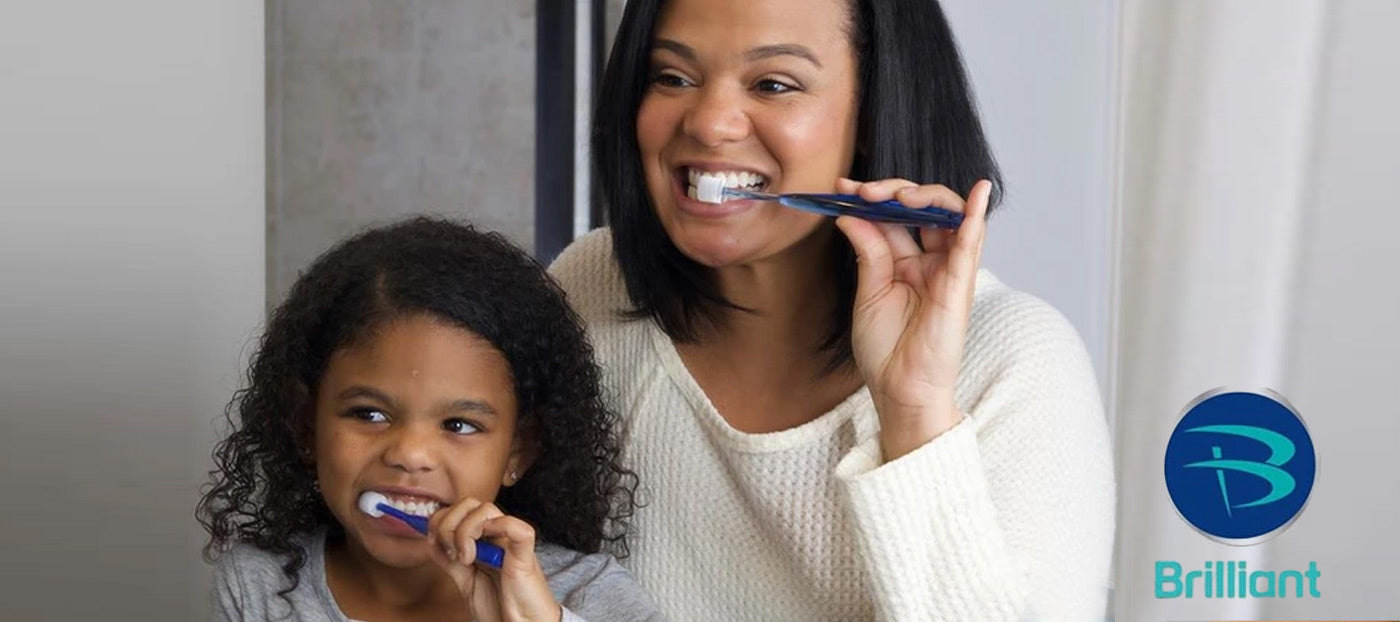- Phone: 1.404.373.4030
- Opening Hours: Mon-Fri 9AM-5PM Eastern

Yes! Cleaning your baby’s mouth is the first step in introducing early oral care routines that will last a lifetime. Start as soon as possible, and continue at least once a day thereafter. This routine trains a baby to accept oral care as part of a regular routine and it also trains the caregiver to perform this task regularly.
No, unless it is prescribed by a dentist, and even then, great caution must take place to ensure that the mouthwash is not swallowed. Most institutions recognize a toddler as a child between the ages of 12 months to 4 years of age. This age range is the time frame where most children are trained to spit safely.
From the very beginning! Once a baby starts to drink breastmilk or formula, it is recommended and appropriate to start an early oral care routine. The earlier a routine is started the better.
Bacteria and fungus naturally live in the mouth of everyone, but babies have particularly delicate immune systems. Starting early oral care not only helps to develop a lifelong routine, it keeps milk residue from building up in the mouth, by gently wiping it away, keeping the oral environment more balanced as the baby’s immune system matures.
It is recommended by some that a baby’s mouth should be cleaned after every feeding. However, this may be a stretch for most sleep-deprived parents. Start by committing to at least once a day, around the same time, and make it a part of your regular routine. You will need a sterile cloth, preferably one that is meant for this activity usually named a mouth wipe or tooth tissue, versus a common household washcloth. Next, wrap the cloth around your adult index finger and proceed to wipe the gums, tongue and inside cheeks of your baby. That’s it, no rinsing required.
Starting oral care early is the foundation. Once that has been established, protecting the oral environment is next, and that means diet and nutrition. Limit snacks in general, but when they are enjoyed, stick to fruits and vegetables and limit foods that are sticky, gummy or chewy as these types tend to adhere to teeth and cause cavities from their higher carbohydrate and sugar contents. Regular bristle brushing should be performed on all teeth, twice a day, by an adult. Visit the dentist when the first tooth erupts or by the first birthday, whichever comes first. No food sources after the nightly brushing, this includes milk.
It is recommended by some that a baby’s mouth should be cleaned after every feeding. However, this may be a stretch for most sleep-deprived parents. Start by committing to at least once a day, around the same time, and make it a part of your regular routine. You will need a sterile cloth, preferably one that is meant for this activity usually named a mouth wipe or tooth tissue, versus a common household washcloth. Next, wrap the cloth around your adult index finger and proceed to wipe the gums, tongue and inside cheeks of your baby. That’s it, no rinsing required.
Once the first tooth erupts it’s time to bristle brush it. Keep doing any other oral care routines on the rest of the mouth like using sterile mouth wipes and silicone brushes on the gums, but implement the bristle toothbrush to the new tooth and continue this routine until all the baby teeth have erupted. You may use fluoride-free toothpaste or a paste that has xylitol as the active anticavity ingredient. Fluoride should not be used until a child can spit correctly and this is usually not achieved until age 4 or 5. Adults should perform all oral care.
Brushing routines should last about 2 minutes, especially once all the baby teeth have come in. Children do tend to have less plaque biofilm that needs to be removed than adults do but training a child in the correct way is the most important step. Twice a day, brush for 2 minutes. To make it fun, get a colorful sand timer or you can sing the ABC song twice, while brushing or even allow some electronic fun by downloading a kid’s oral care app that keeps track of brushing frequency and timers, rewarding compliance with stickers and stars.
A Bristle baby toothbrush should have soft flexible bristles that are gentle enough to brush newly erupted teeth effectively. The head of the brush should be small enough to fit in a small mouth, and the handle should be comfortable for an adult to hold while using the brush on the baby’s teeth. Baby silicone toothbrushes are another great choice for teething gums before teeth fully erupt. You can use both, simultaneously as needed, a silicone toothbrush for teething babies to clean budding gums while bristle brushing newly erupted teeth.
Adults should perform ALL oral care for children up until the age of 5. This does not mean that you cannot start brush training before then, age 3 is a good training age. it just means that the actual cleaning is done by you first, and the practice training is done secondly by the child with your direct supervision while they are learning. Allow children to practice brushing by brushing your teeth as you brush theirs, this is a great activity that can be started early.
© 2020 Compac Industries. All rights reserved.
This article is intended to provide an understanding of and knowledge about “oral health topics” as expressed through the perspective and experience of the author. It is not intended to be a substitute for professional advice or counsel, including the diagnosis or treatment of any condition. Always seek the advice of your dentist or other qualified healthcare provider with any questions you may have regarding a medical condition, an oral condition, illness or treatment of any listed or non listed situation above. By using this site, you signify your assent to our Terms and Conditions. If you do not agree to all of these Terms and Conditions, do not use this site.


DISCLOSURE: Noelle Copeland RDH is an Oral Care Specialist and Dental Consultant who provides content

DISCLOSURE: Noelle Copeland RDH is an Oral Care Specialist and Dental Consultant who provides content

We believe that all people are fearfully and wonderfully made and designed in the womb for a grand purpose.
Useful Links
Copyright © 2023 Compac Industries | All Rights Reserved.